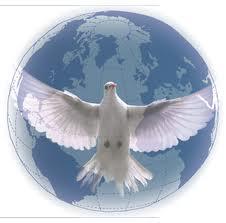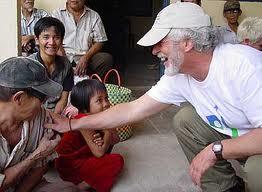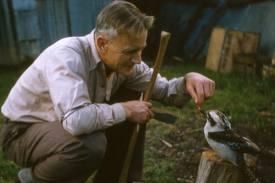Making A Difference
If you planted hope today, in any hopeless heart,
If someone’s burden is lighter because you did your part
If you caused a laugh that chased some tears away
If tonight your name is named when someone kneels to pray
Then your day has been well spent.

When I am not having a good day or my thoughts go astray and away from the positive, I remind myself of the above sentiment. I think that each of can relate to an experience where we were on the receiving end of one the above actions, ones that had a significant effect on us. At the same time,we may also not be aware of the impact we can have on others. A friend posted the short saying above on Facebook. My only comment was (I have edited it slightly):
“We do not have the control we imagine, the power to make everything "right" nor the ability to always see things in a positive way. Yet, if we can remember what you have posted ... we realize we can make a difference that is of benefit to someone and, hopefully, we can find some peace of mind by and some comfort in doing so."
This is the topic for this week’s composition, as it did trigger the chain of thoughts and intuitions that led to it. What it had me thinking about was people’s state of mind. I thought about how our state of mind affects our openness to the above and even the openness to be on the receiving end of such acts. It was a thought that stayed with me.
This led me to the pondering the energy we have when we do such things, then beyond that to how our spirit, thoughts and emotions can affect others. Most of us have many opportunities every day to do these kinds of things and at times we do. A significant factor in whether we do so is simply our state of being at the time. Further, how we react to others we encounter plays into the dynamics of the moment by potentially enabling or blocking the opportunity to be on the giving or receiving end of such acts.
What makes it harder to do is not, for the most part, lack of desire to do so; it is that we do not actively enable it. It is not because we are out of touch with our core, though that is a factor. It is also because we do have not enabled our mind as much as we could.
We are what we think, hence, if we are not able to do or receive such things freely then it is our thoughts that are restricting us. So how do we get better at it? We work on our thoughts, namely: having the want to do so, having the belief or thought that it is worthy to do so and by strengthening our beliefs that we can have a positive effect on others and we can be open to accepting such gifts.
For some, such things seem second nature, they actively find ways to help people, to brighten their day or lighten their load. For others it can simply be a lack of enabling thoughts and the presence of blocking ones. Both of these are the result of our reactions to experiences. Regardless of how much or little you do such acts, or are open to receiving them, we can all become better at it.
Fundamentally, acting in the fashion we are referring to requires we have at least these four qualities:
- We must “want” to do so
- We must believe it is worthy
- We must believe that it makes a difference
- We must believe that we can do it
What we choose to do or not do, what we like or do not, what we seek in life and what we do not comes from our Rational Mind (RM). Our reaction to experience and the subsequent integration of them programs our RM (1). All of the above points to the idea that our ability and willingness to help others, to make a difference in their lives comes not just from something innate within us, but also from how we have learned to think and act. You might say that giving comes from within and is not part of our RM, I believe that is only partially true as our thoughts clothe our inner self, regardless of what its qualities are and it is our thoughts that either enable or block such natural impulses (2).
In terms of the first point, I believe everyone will understand it, at least figuratively. Note that by want I do not mean want in the sense of “I want this or that ....” it is a want to give, an outpouring of self. In its natural form, unencumbered by our RM, it refers to the desire to do for others, the innate aspect of us I referred to above. One cannot “sort of” want to do it or will do it when it is convenient and after we have met other needs. It must be singularly important to do so, almost regardless of our own state of affairs. The reason is that thoughts such as this allow us to be open possibilities and less encumbered by the demands of other needs.
When you think about the fact that most of us, certainly in the developed countries, have so few actual life threatening needs to be met, surely there is room for such acts as these without there being any risk to self? That said, we can begin down this path by “thinking” we want to do so and then acting upon it when the opportunity arises.
In trying to develop this quality, one will meet resistance; this is helpful, for from there one can find the thoughts that manifest it. Each of these thoughts will need to be resolved or at least worked on, as they surface. Remember, these thoughts are the clothes our inner-self wears, our inner-selfs expressions are not thoughts or beliefs. Our beliefs can facilitate our intent, but I am referring to feeling it with and through our spirit.
It is important to note that one can think about a want, ponder it, have thoughts about how to fulfill it or express it in thought form, but one does not consciously think "I want this”. If that were so we would always be able to say what we want at all times and if we are being honest with ourselves we know that we cannot. Wants come from within and are clothed in our thoughts as determined by the programming of our RM (3).
You will know your “want” is coming from the right place when you cannot think about it and only feel it, be it. It is a wordless thing, as Eliphas Levi tells us “All magic is in the will.” It is want, and not the personal “I” want, that enables the free flow of energy, which we may end up expressing in acts such as those to which I am referring.

This brings us to the second point, believing it is worthy to act in such a fashion or that we are worthy to be on the receiving end of them. This is not as straightforward as it may sound. It is not a matter of thinking that it is worthy, because we may also have thoughts that make other things as more worthy or important. While we must believe it is worthy, it is important to note that this alone will not be sufficient for we have other things we believe are worthy as well, and they will have a ranking associated with them. You may need to consider what other things you find worthier and why. If either quality one or two is well down the scale of importance, they will happen less frequently.
It is also important to believe that doing such acts makes a positive difference; this even applies to our being able to receive them. This is an enabling thought form. We are social animals, and in each of us is the desire to make a difference or to help others; however, not believing it can make a difference is a powerful inhibitor. If we do not believe it can make a difference then we are unable to give freely, or receive without reservation, this is important to note. Lack of sincerity renders giving conditional and can negate, block or at least reduce our acts of kindness or caring. We should freely show our caring, compassion and love for others without consideration for self. Some may not be able to be accepting of the giving, if they sense insincerity in others. Further, we can construct barriers for a multitude of reasons including fear, timidity or trust.
The most important reason to believe it makes a difference is that this thought tends to encourage us to give to others. If we do not believe we can make a difference in others lives, we may not be so inclined to give. Further, we must not expect that others will necessarily accept it, and that has to be acceptable as well. We must give with no thought of return or benefit to self. Such conditionality affects our act and can sabotage it as people can sense the conditionality and choose not to be open to accepting the gift.
Lastly, we must believe that we actually can do such things. We often believe that no matter what we do, it will not turn out as we expect or that others will be distrustful. If we hold onto such limiting thoughts, our uncertainty can prevent us from even trying. Our belief in ourselves is a powerful aid. If we do not believe we can make a difference or that we will not be any good at doing so, we are less likely to bother acting in such a caring manner.
I am not trying to dissect this to the nth degree, only to make you aware of some of the thoughts that can prevent us from being that light in the darkness for others. If we do all of what I suggest, we find that our inner-self will make it happen. We do not need to force it, or to look for opportunities to aid others, they will happen naturally and as a result will be even more powerful. The human spirit is a wondrous thing, which we often fail to allow because our thoughts get in the way. It is similar to intuition, in that it should flow freely without the mind getting in the way.

When we have these as strong beliefs and thoughts, it shows in our energy, which in turn affects our relationship with everything. The world is not silent, and we merely people wandering through it, separate from it. That separateness is an illusion, one that we can bridge in part, by what I suggest today. “Miracles happen” when we are open to opportunities, when we have less blocks and filters to our being.
We can look back to a time in our lives when we were on the giving or receiving end of some act of kindness or gift. Think about those times and what made them possible. I am willing to bet that you had all four of the qualities. There are others, of course, but these are at the top or among the top reasons we are able to do such things.
One can start by trying, through watching and observing, to look for opportunities to be of assistance to others. This may not be the best way to go about it, for our thinking minds will try to analyze situations to determine if we can help; however, doing so this also affects on our thinking processes. In addition, our minds will only try to do it in ways it “thinks” will work; this is the antithesis of what we seek to do.
We are telling our thinking mind that such things matter to us, and we intend to make a difference. This may seem unimportant; I can assure you that it is not. Over time, if you are persistent, you will find you do not need to do so. It will begin to happen naturally; you will simply be in the right place, at the right time and have the right words or actions to make a difference. Following this path will also helps develop our intuition and reorder what is important in a way that will benefit not just others but us. The affect of this will filter all through your life, in positive and unexpected ways.
The difference we can make with a word, a smile or an act of unreserved kindness is truly incredible. If we can do so freely without consideration for anything, it can change the lives of others in ways we never imagined. The same goes for receiving from others, something I have to work on. I find it far, far easier to give than to receive, in part because of old programming in my mind.
I am getting better at it, though for the longest time I fought it because my mind told me that to accept help from others indicated a need for help, also I had been hurt often enough to lack trust in the sincerity of others. The former came from my father. He did not raise me to be dependent on others. He taught, or at least tried to teach self-reliance, discipline, control and that if you want something you need to go and get it. He made sure I knew his version of the Protestant Work Ethic “Society owes you nothing, you owe society”. My mind kept trying to tell me that accepting help from others was proof that I was incapable of doing what I needed to do and that I was not living up to the ethic. Therefore, to accept help was to admit failure.
We create a trust block when people we trusted break our trust or faith in them. It occurred enough that I came to think there was a catch to offers or it they were valid only for a limited time. It is a funny notion, I know, but it is what I dealt with.
What I failed to realize that was that in many cases, others simply wanted to give and that I was denying them that as I was in denial myself. When I started to allow myself to care more fully for others, I found it included caring about what they wanted to do regardless of how I felt about it. What occurred to me was, “who was I to deny them the enjoyment of giving for the sake of giving alone? “ I also had to accept that it was not weakness or a fault to accept an offer.

The trust part was harder to deal with, and is the one area I still work on, though I now know when I am doing it! My fear of being hurt was preventing me from accepting from others, until I realized that this was also cutting me off from others, isolating me within my own mind. For an empath, this is far worse a fate than being hurt, so I decided that I had to work to change it.
What I did was work on my thoughts around it. It started with accepting that some people struggle with honesty and integrity, that they would be different if they could be, but that is still not reason to be distrustful so often. Interestingly enough I also had a fear of big dogs, but a friend helped me to understand that the fear itself can trigger a dog to react when it likely would not have otherwise. I thought that my lack of trust was manifesting circumstances where trust is an issue so that I could work on it. Interestingly enough, I also realized that my lack of trust hampered my empathic side, which, if active, would have alerted me to whether to trust or not.
I have some wonderful friends, a number of whom are aware of this, maybe not consciously, but every now and then they will find a way to let me know that I should suck it up, accept what is offered and let it be. They never asked anything in return, and never bug me about it; though the odd tease is not out of the question. They accepted me as I am; they showed and gave me reasons to trust.
I thank my friend for the post, which contained the words at the start of this composition; it sparked me to write this TOD. The words in the post are ones I have seen in many forms, yet this time it caught me in a way I could not shake. It reminded me of two questions I ask myself frequently, these being “have I made a difference today?” and “have I allowed myself to accept from others today?” If I can answer yes to these, then it has been a great day indeed!
I feel my being
It stretches before me
I feel my being
Reaching out
In the moment
The gift is to be
And be at one
Distance – fades
Separateness - lost
Questions – pass
And the sun shines down
Illuminates the waters
And casts shadows away

© 2011 Allan Beveridge
Last updated April 26, 2016
References (*- denotes essays only available to site members)
- Introduction to the Rational Mind (RM)
- *Limiting Aspects of the RM
- The Nature of Thoughts Part 1 and 2

